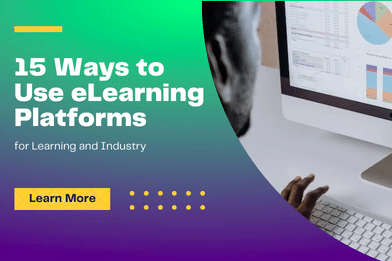In the contemporary and dynamic environment of the present era, the conventional limitations of education have significantly broadened, extending well beyond the traditional bounds of physical classrooms. The advent and extensive implementation of eLearning platforms have initiated a novel epoch in the field of education, marked by enhanced accessibility, flexibility, and increased levels of participation.
The paradigm shift discussed in this context has brought about a significant transformation in the approach individuals take toward learning. This change has impacted several groups, including students, educators, and professionals, by offering a wide range of unique chances to gain knowledge, refine skills, and stay updated with the latest advancements in their respective domains.
Keep reading to learn fifteen successful ways for utilizing eLearning platforms to enhance learning experiences in various industries and circumstances.
1. Diverse Learning Materials
The advent of eLearning platforms has brought about a paradigm shift in the delivery of education since they provide a wide array of learning resources that are both diversified and comprehensive in nature.
These platforms have emerged as a crucial resource for individuals of various age groups, providing a diverse range of educational materials including films, documents, interactive simulations, quizzes, and other resources.
The assortment of materials is intentionally crafted to cater to a wide range of learning styles, thereby enriching the educational process by promoting active participation and increasing efficacy.

2. Virtual Classrooms
The advent of e-learning platforms has brought about a significant transformation in the delivery of education, effectively bridging the divide between traditional brick-and-mortar classrooms and online learning settings. These platforms offer instructors a range of robust tools to effectively replicate a dynamic and captivating virtual classroom environment that closely resembles the conventional in-person setting.
E-learning platforms facilitate the delivery of educational content and engagement between teachers and students through the integration of novel technologies and interactive features. This allows for the rapid conduct of lectures, facilitation of discussions, and organization of group activities, all inside the comfort and convenience of students’ own homes.
3. Personalized Learning
eLearning platforms allow teachers to tailor courses to individual students’ needs and abilities. This personalized approach enhances the teaching and learning experience, thereby fostering quick retention rates.
With the increasing demand for personalized learning, factors like math tutor price have become an essential consideration for many families and students. Understanding math tutor price can help learners make informed decisions when seeking the best educational support.
The fundamental characteristic of this individualized instruction resides in its capacity for adaptation. Educators have the ability to employ a diverse range of methodologies and technological tools in order to assess the strengths, limitations, and learning preferences of students.
4. Video Lessons
Leverage the power of video to deliver engaging lessons. Visual content makes complex topics easier to understand and remember, enhancing the learning process.
5. Interactive Content
Incorporate interactive elements such as quizzes, polls, and simulations to actively engage students. This approach keeps learners involved and helps them grasp concepts more effectively.
6. Microlearning
Bite-sized modules on eLearning platforms offer concise, specific content that can be easily consumed during short breaks, optimizing time utilization and promoting regular learning habits.
7. Virtual Reality (VR) Integration
Explore the world of virtual reality to create immersive learning experiences. Industries like healthcare and aviation can simulate real-world scenarios, making learning more practical.
8. Learning Management Systems (LMS)
Utilize learning management systems to organize course materials, assignments, and assessments. LMS streamlines the learning process and facilitates effective management.
9. Career Advancement
eLearning platforms often provide certification programs that can enhance a learner’s resume and open doors to new career opportunities and advancements.
10. Industry-Specific Training
Industries can use eLearning platforms to provide specialized training to their employees. Whether it’s compliance training or skill development, eLearning offers a convenient way to ensure employees stay updated. This flexibility not only boosts professional development but also contributes to the overall efficiency and competence of the organization.
11. Continuous Learning
Learning doesn’t stop after a single course. eLearning platforms allow individuals to continuously upskill themselves by enrolling in various courses, keeping them relevant in a rapidly changing job market.
12. Collaboration and Networking

eLearning platforms often include forums and discussion boards that facilitate interaction among students. This virtual networking enhances the learning experience and allows for knowledge exchange. Students have the opportunity to acquire knowledge through the exchange of opinions, so obtaining novel insights and alternate viewpoints that enhance their comprehension of the subject matter.
13. Adaptive Learning
Some eLearning platforms use data and analytics to identify each student’s strengths and weaknesses. The system then tailors the learning path to address the individual’s needs, resulting in a more effective learning journey. After the collection of these insights, the eLearning platform employs an adaptive approach to education.
This entails customizing the educational trajectory for each individual in accordance with their unique characteristics. The implementation of a tailored strategy allows students to actively interact with the subject matter that aligns with their individual strengths, while simultaneously dedicating increased attention to areas that provide difficulties.
14. Efficient Resource Management
Educators can quickly organize and update course content by leveraging eLearning systems. The implementation of this efficient strategy for resource management ensures that students have uninterrupted access to the latest information, hence creating a conducive learning environment that promotes effective learning.
15. Feedback Loop
Constructive feedback is a pivotal element for the growth of both learners and instructors. eLearning platforms play a pivotal role in simplifying the process of educators offering valuable, positive feedback, and facilitating student advancement. Additionally, these platforms empower students to contribute their insights regarding the course framework and material, fostering a collaborative and adaptive learning environment that addresses their needs more effectively.
Final Thoughts
eLearning platforms have revolutionized the way we approach education and industry training. With their virtual tools and versatile capabilities, they offer an environment conducive to effective learning, skill development, and industry growth. From personalized learning experiences to industry-specific training, the potential applications of eLearning platforms are vast.
As technology continues to advance, embracing these platforms will become increasingly essential to stay competitive in today’s rapidly changing world. So, whether you’re a student looking to expand your horizons or an industry professional aiming to stay ahead, eLearning platforms have a role to play in your journey of growth, development, and success. Don’t hesitate to check out our other blogs for further readings.
FAQs
Q: What is eLearning?
A: eLearning, or electronic learning, is the use of electronic technologies to deliver educational content and training programs. It can be accessed anytime and anywhere through the internet or other digital devices.
Q: How can eLearning platforms benefit students?
A: eLearning platforms provide a variety of benefits for students. They offer flexibility in terms of when and where students can learn. They provide access to a wide range of courses and resources. They also allow students to learn at their own pace and review material as needed.
Q: Can eLearning platforms be used for course development?
A: Yes, eLearning platforms are often used for course development. They provide tools and templates to create engaging and interactive courses. These platforms allow course designers to incorporate multimedia elements, quizzes, and assessments into their courses.
Q: How do eLearning platforms enhance learning retention?
A: eLearning platforms use various strategies to enhance learning retention. They provide interactive modules and simulations that engage learners. They use multimedia elements such as videos and animations to make learning more memorable. They also offer spaced repetition techniques to reinforce learning over time.
Q: Are eLearning platforms simple to use?
A: Yes, eLearning platforms are designed to be user-friendly and intuitive. They have a simple interface that allows users to navigate easily. They provide step-by-step instructions and tutorials to help users get started. Most eLearning platforms require little to no technical knowledge to use.
Q: Can eLearning platforms be used in schools?
A: Yes, eLearning platforms are commonly used in schools. They provide a digital learning environment where students can access course materials, communicate with teachers, and submit assignments. eLearning platforms can be integrated into both traditional and online schools.
Q: How do eLearning platforms benefit teachers?
A: eLearning platforms provide teachers with tools to deliver content and engage students. They automate administrative tasks such as grading and tracking student progress. They allow teachers to easily create and customize courses. They also provide analytics to measure student performance and identify areas for improvement.
Q: Can eLearning platforms help with course design?
A: Yes, eLearning platforms have features that simplify course design. They offer pre-designed templates and themes for course materials. They provide tools to create interactive content and assessments. eLearning platforms also allow course designers to easily update and modify course materials as needed.
Q: Do eLearning platforms require digital skills to implement?
A: No, eLearning platforms are designed to be user-friendly and require little to no technical expertise. They provide intuitive interfaces and step-by-step instructions for users. eLearning platforms can be easily implemented by teachers, trainers, and instructional designers without extensive technical knowledge.
Q: How can eLearning platforms save time for course managers?
A: eLearning platforms automate many administrative tasks and processes, which saves time for course managers. These platforms can handle tasks such as enrolment, tracking learner progress, and generating reports. eLearning platforms also allow course managers to easily communicate with learners and provide support.






